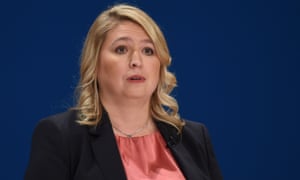
The culture secretary, Karen Bradley, has stressed her commitment to a free press and lavished praise on newspapers in comments that will revive suspicions that the government is preparing to ditch a proposed media regulation law.
Speaking on the Today programme on Thursday, Bradley said that for many centuries newspapers had done their job “fantastically” and she wanted this to continue.
She also refused to defend section 40 of the Crime and Courts Act 2013, which was passed as one of the measures intended to toughen press regulation in response to recommendations from the Leveson inquiry.
Section 40 has not yet been implemented. If it does come into force, it will ensure newspapers that do not belong to a royal charter-approved regulator – as the vast majority of British news organisations currently do not – would have to pay the costs of their opponents if they were sued for libel even if they won.
The newspaper industry is overwhelmingly opposed to section 40, and last month Bradley launched a consultation on whether it should be implemented.
All main parties backed the section 40 legislation when it was passed three years ago but in her interview, when Bradley was asked to say if she supported the principle of newspapers outside an official regulator having to pay court costs even when they won, she repeatedly refused to defend the idea. She said it would be wrong to give a view while the matter was still the subject of a consultation.
But she did play down the need for change, arguing that press freedom had served the country well for centuries.
“What I’m keen to make sure is that we have press regulation that works, to make sure that victims of press intrusion can make sure they have access to justice, cheap justice, but also that we have a free press, that enables the press to do the job that they have done so fantastically over so many, many centuries, to [hold] the government to account and to make sure that we have the thriving democracy that we do have,” she said.
The consultation closes in January and it is widely expected that it will result in the government deciding not to go ahead with implementing section 40 in full.
Instead, the government could decide to repeal section 40 or keep the option of implementing it under review, so it could be activated at some point in the future.
A fourth option the government is considering would be to shelve the punitive aspects of section 40 that mean papers not signed up to an official regulator are liable for libel costs even if they win, but to retain another part of it that says papers belonging to an approved regulator are exempt from paying their opponents’ costs even if they lose.
Only a small number of organisations belong to Impress, the regulator that has official recognition. Most newspapers instead belong to the Independent Press Standards Organisation (Ipso), which is not Leveson compliant.